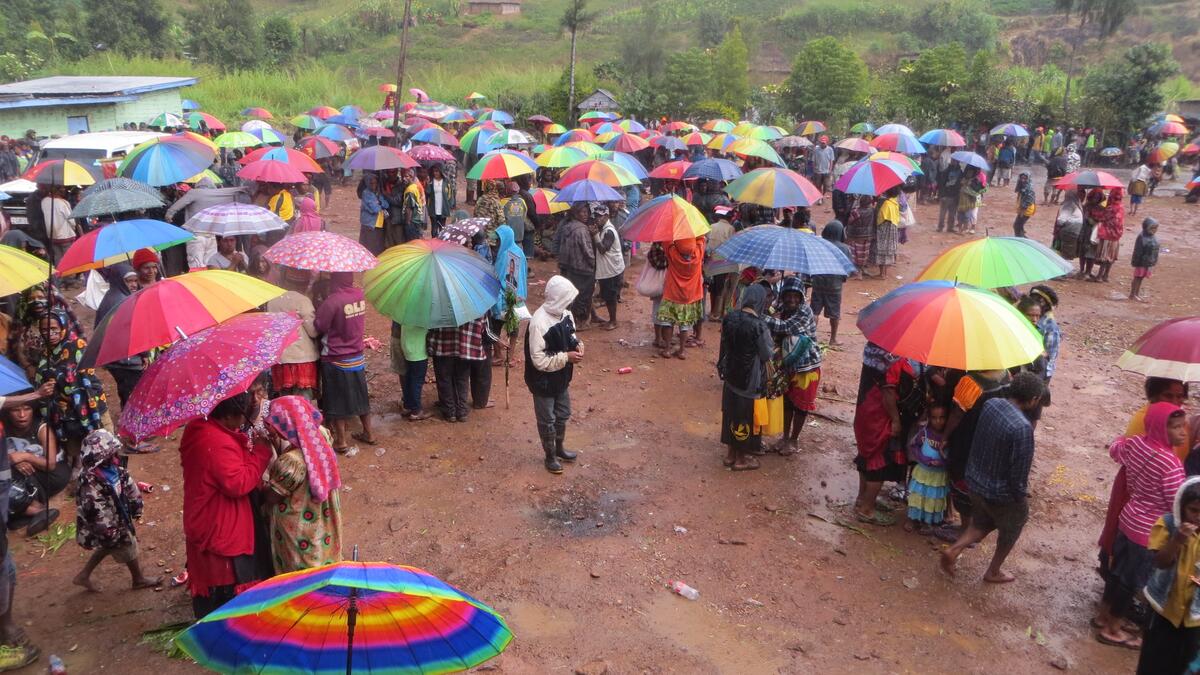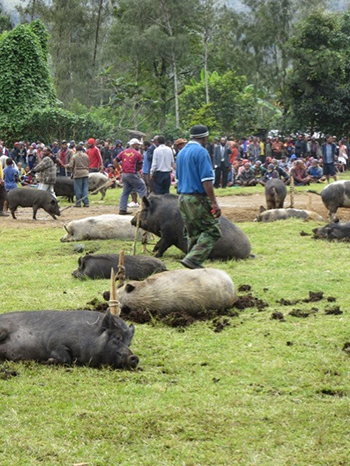Community input is crucial to restoring justice in some small societies

A man steals another man’s property. The victim beats up the thief, and the thief retaliates by seriously injuring the other man’s hand.
In a Western justice system, a judge would consider putting the accused in prison for theft and assault. In some small societies, like communities in the Enga Province of Papua New Guinea, a village court tries to address the impact of the crime on those involved.
In this case, a panel of local magistrates worked out an agreement that compensated the victim in livestock and cash. Clan members and the accused’s family took into account the injured man’s limited ability to work and future medical expenses, and gave far more than the agreed-upon amount. They did so in an attempt to make up for the harm inflicted and to restore harmony and cooperation in the community. This process is known as restorative justice.

Polly Wiessner
Polly Wiessner, a professor in Arizona State University’s School of Human Evolution and Social Change, has been working with small communities for more than 40 years. She recently analyzed more than 300 village court sessions in Enga, focusing on how the restorative justice system adapts to changing cultural norms. These norms have been influenced by the adoption of new technologies such as mobile phones, weapons, cash and motor vehicles.
Alongside a team of Enga collaborators, she observed how crowds responded during the proceedings, aiming to better understand how the community is engaged in enforcing and adapting societal norms. The researchers then followed up to see what resolution or settlement actually occurred.
The findings show that input from the crowd attending the hearing is crucial in the decision-making process and settlement.
In a small community, many people are aware of wrongdoing before it appears in these customary courts, and the magistrates need to take into account the perception of community members. By listening to all sides, the magistrates are better equipped to order a settlement that satisfies both parties, reducing the likelihood of revenge or retribution.
“Papua New Guinea has a plural justice system, meaning they have formal courts imposed by colonial powers and customary courts which draw on the power of community and customary law,” Wiessner said.
Most cases are taken to village courts to be resolved within the community instead of the formal court system.
Focusing on the community
Wiessner focused on cases about marriage, property and land disputes, and assault.
Of the 333 cases she studied, the crowd was quiet only 44% of the time. Overall, the crowd had the least input on land disputes, and the most feelings to convey during marriage complaints. The social contract of marriage has seen immense changes in norms in the last few decades, which impacts the social fabric and many aspects of life in small communities.
The crowd tended to show displeasure, through ridicule and swearing, during hearings that involved extreme cases of adultery, while hearings that promoted restoring relationships were more likely to receive support.
The findings also stress that a punitive justice system is unlikely to be effective within Enga communities. A restorative justice system, focusing on making amends, is necessary to maintain community. Jail time was not recommended in any of the cases Wiessner examined.
“What was surprising to me was that they almost always pay a lot more than they have to.”
— ASU Professor Polly Wiessner

Community members assembling compensation, in the form of livestock, for a wrong done.
One surprising observation was that often, when the wrongdoer could not afford to pay the settlement, community members chipped in and offered cash to help them make amends and restore their reputations and relationships. Wiessner explained that in the smaller communities, typically consisting of 200 to 500 people, everyone has something to give. Community members depend on each other, and the society is built on sharing and exchange. They can’t afford to lose people by sending them away to jail, and instead want to keep their skills and positive contributions in the community.
“What was surprising to me was that they almost always pay a lot more than they have to,” Wiessner said. “To honor their reputation and to say to the person, ‘OK, someone did something wrong, but we're going to make this right and you're going to start anew.’”
Restorative justice differs from the punitive justice system seen in many industrialized societies, but Wiessner notes there are some youth courts in countries like Australia, New Zealand and Canada that successfully integrate restoration into settlements.
“There is much to learn from small-scale societies about the benefits of balancing retribution and restitution,” Wiessner said.
Adapting societal norms
70 years ago, traditional Enga horticultural communities lived off subsistence agriculture in highland areas of Papua New Guinea. Today, with the introduction of industrialized technologies, communities are still living in the mountainous areas of Papua New Guinea, but life looks very different.
People communicate and interact in new ways, and attitudes about warfare, power, marriage and honor have changed. For example, instead of knowledgeable village elders holding strong positions of authority, younger men have acquired guns and gained influence, and the introduction of cellphones has coincided with increased rates of adultery and divorce.
Technology has been changing culture and shaping communication for decades. Given the continued adaptations to increased use of technology, Wiessner plans to keep researching societal norms. In Enga, traditions have been challenged since colonization in the 1950s, more so as new technologies become more popular.
“We're absolutely continuing this research. We're trying to expand it geographically, and we want to look at changes through time,” Wiessner said. “Because people are changing and attitudes are, too. Even now, during COVID-19, our team is still working very hard, doing marvelous work and sending me updates on cases every week.”
The paper “The role of third parties in norm enforcement in customary courts of the Enga of Papua New Guinea” published in the Proceedings of the National Academy of Sciences in December.
Funding and support came from NSF award 1917824: Restorative Justice among the Enga of Papua New Guinea: Adapting to a Changing World, the Enga Provincial government, and the Tradition and Transition Fund.
Top photo: A village court session ending in the Enga Province in Papua New Guinea. ASU Professor Polly Wiessner notes court sessions are often interrupted by afternoon rains. Photo courtesy of Polly Wiessner
More Arts, humanities and education

ASU alum's humanities background led to fulfilling job with the governor's office
As a student, Arizona State University alumna Sambo Dul was a triple major in Spanish, political science and economics. After graduating, she leveraged the skills she cultivated in college —…

ASU English professor directs new Native play 'Antíkoni'
Over the last three years, Madeline Sayet toured the United States to tell her story in the autobiographical solo-performance play “Where We Belong.” Now, the clinical associate professor in…

ASU student finds connection to his family's history in dance archives
First-year graduate student Garrett Keeto was visiting the Cross-Cultural Dance Resources Collections at Arizona State University as part of a course project when he discovered something unexpected:…